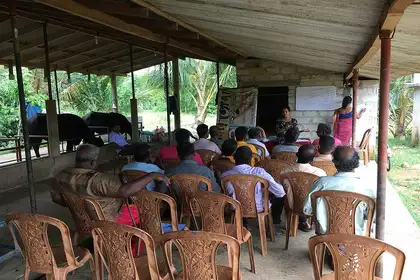
A data gathering session with farmers in Sri Lanka as part of the project.
The 28th of April marks World Veterinary Day which is an important occasion for New Zealand’s only veterinary school, but equally so for Sri Lanka’s only school at the University of Peradeniya, whom Massey has been working with for the past four years.
The theme for World Veterinary Day 2018 is the role of the veterinary profession in sustainable development to improve livelihoods, food security and safety. What better example of this theme, than a five-year project between Massey University and Sri Lanka’s University of Peradeniya to strengthen veterinary education.
The five-year twinning project was designed to review and update both the curriculum and teaching at Peradeniya’s Faculty of Veterinary Medicine and Animal Science, and to encourage the faculty to take their expertise out to livestock owners, particularly small holder dairy farmers, by harnessing the internationally recognised talent which Massey’s School of Veterinary Science has to offer.
The veterinary twinning model is an institution to institution development model introduced by the World Organisation for Animal Health in 2012, that aims to raise the standard of veterinary education around the world, particularly in developing and transition countries.
Now well into its fourth year, the twinning programme director Dr Lachlan McIntyre says the benefits are clear for both New Zealand and Sri Lanka.
“Like Massey’s School of Veterinary Science, they are the only institution in Sri Lanka that educates veterinarians. For Peradeniya it provides access to expertise in both curriculum development and specific subject areas and a pathway for professional exchanges and mentoring of future lecturers through postgraduate study at Massey.
“For Massey it’s an opportunity to take the best of what New Zealand has to offer, in terms of veterinary, agricultural and educational expertise, to the world. We have opened up a raft of new, collaborative research opportunities, not just in the veterinary and animal sciences but also in approaches to teaching veterinary students.
“We are now at the point where this new curriculum will receive formal approval and be implemented later this year.”
Making changes
The project has completed a wide range of activities which prepared and supported the veterinary faculty as they have developed a modern and best practice modelled new curriculum.
Since the start of the project, Massey has held several workshops to train local staff and gather information to inform further development of the curriculum and teaching. The most recent of these was used to identify the factors limiting local dairy production and find ways for the veterinary faculty to address those which are within its ability to respond to, thus providing training opportunities for students and staff alike.
This week one was on the University’s Manawatū campus for a two-week block of training in educational theory. She will form the core of a new centre of expertise which will manage and maintain the quality of the new curriculum into the future.
Over all the project is world leading and ground breaking, however Dr McIntyre says with this kind of change, there are substantial hurdles.
“We are talking about a ‘ground-up’ review that changes almost every aspect of the degree programme and many aspects of teaching with even the length of the degree changing from four to five years.
“The very essence of the teacher-student relationship is changed as a curriculum moves from a teacher-centred focus to a student-centred focus. This is challenging for staff and students in a very hierarchal society.
For some of the other changes introduced, we have been focusing on engagement and consultation along the way with key technical stakeholders from both government and industry providing direct input in the design of the higher level curriculum content, by identifying important topics to strengthen the proposed curriculum.”
Key curricular developments include the introduction of a lecture-free final year of clinical rosters; early introduction of courses in animal handling and farm production; introduction of case-based, experiential-learning courses every year; and the teaching of core professional skills, giving veterinary students an understanding of the critical aspects that affect interactions with clients and co-workers.
“This new curriculum is intended to have multiple positive outcomes, Dr McIntyre says. “producing graduates who are better trained to meet the needs of Sri Lankan society, facilitating the faculty’s role in local dairy extension and animal health programmes, positioning them for taking a regional leadership position, and leaving the Faculty well placed to progress towards international veterinary accreditation if it chooses to do so.”
“The strong links developed by the partners will leave them well placed to collaborate together in the future.”
However, the project is not just about education within the University.
“A large part of the programme is encouraging and teaching faculty members how to take their expertise out to the rural livestock-owning community so they can also benefit from the new curriculum.”
More than academic
The dairy acceleration programme which underpins this part of the project, has seen Professor Danny Donaghy and Professor Anil Pushpakumara, working on new approaches to bring small holder dairy farmers and veterinary students together for mutual benefit.
Dr McIntyre says as with many of these large projects, it has been a team effort with a substantial commitment of time and effort by university colleagues including Professors Tim Parkinson and Donaghy providing detailed technical support, Professor Paul Kenyon and Mr Michael O’Shaughnessy providing governance support and many other colleagues across a wide spectrum of university expertise providing valuable input.
The valuable support provided by Ministry of Foreign Affairs and Trade and Ministry of Primary Industries officials, was highlighted by the team as a strength of the project. The project is funded by the Ministry of Foreign Affairs and Trade’s New Zealand Aid Programme and approved and endorsed by the World Organisation for Animal Health (OIE).